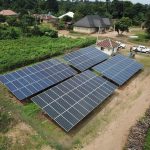
Niger Delta Minister calls for Swift Transition to Renewable Energy : Unveils Plan for Solar-Powered Communities in the Region
February 2, 2024
EU Flags off 6.5 Million Euro Projects with Consortium members for peace Building in 66 Niger Delta Communities
February 7, 2024The Niger Delta Development Commission NDDC is taking measures to prevent the looming food crisis threatening the economy, even as the region’s Agric sector records impressive export turnover of over $20 million per year.
During a capacity-building retreat for the Department of Dispute and Conflict Resolution, held in partnership with the Peace and Development Project (PEDEP) in Lagos, the Acting Director of the Conflict and Dispute Resolution Department at NDDC, Godwin Ogedegbe, assured attendees that NDDC and some development partners have committed over $2 billion to initiatives aimed at building peace and addressing macro- and socio-economic issues in the Niger Delta region. Mr Ogedegbe stated that the commission is also partnering with state governments in the region to ensure food security while boosting production and addressing export threats.
He explained that as most of the region’s population lives in rural areas, with a large number of people relying on agriculture, including forestry and fisheries, for their livelihoods, and the Commission is determined to pursue pragmatic conflict resolution approaches while continuing with the selection of projects and actions that contribute to its strategic objective of making food and agriculture more productive and sustainable.
He said the leadership of NDDC is working with communities to enable an environment that will help to keep food prices at an affordable rate while preventing conflicts in the region that will disrupt supplies from major production belts.
According to him, the NDDC is resolved in its determination to support farmers in the Niger Delta to boost agricultural production to combat food shortages.
He noted that food security is crucial to maintain social stability and peace, adding that it was one of the reasons the workshop was held, which focused on finding sustainable ways to improve the conflict management capabilities of the staff of the commission.
Indicating some efforts the organization had put in place to revolutionize farming practices, enhance food security, and improve the socio-economic well-being of local communities.









